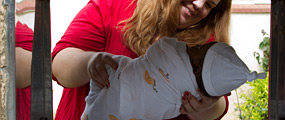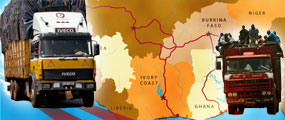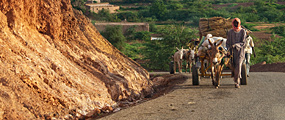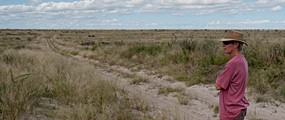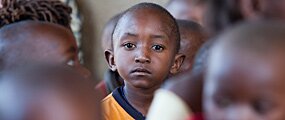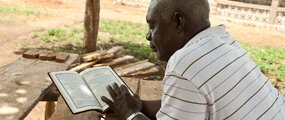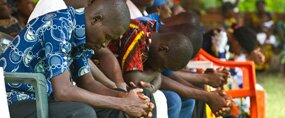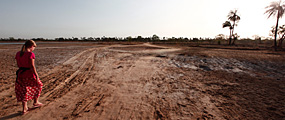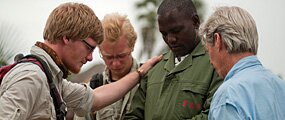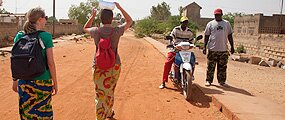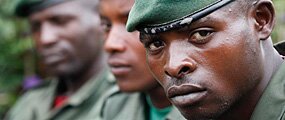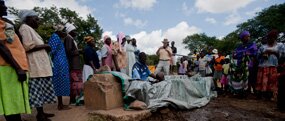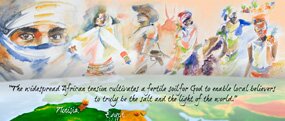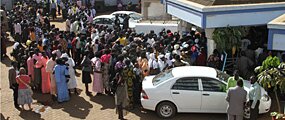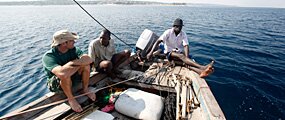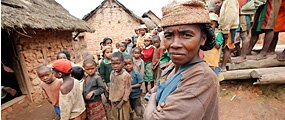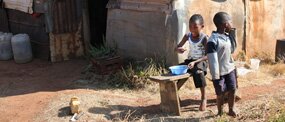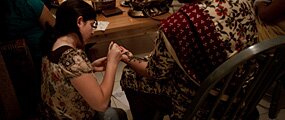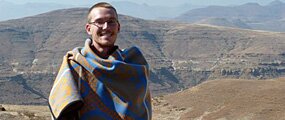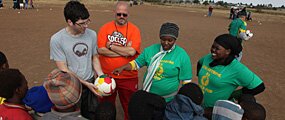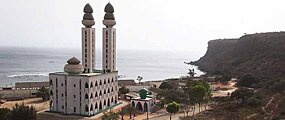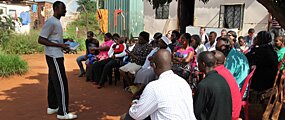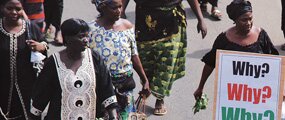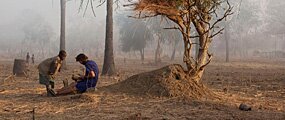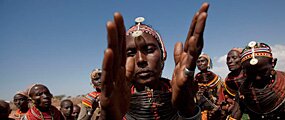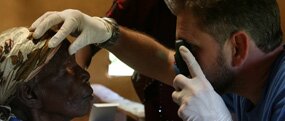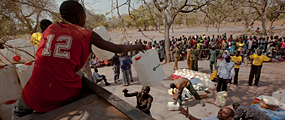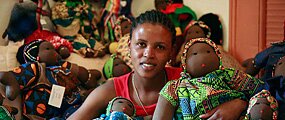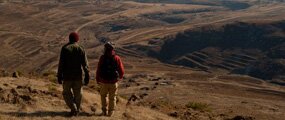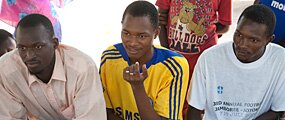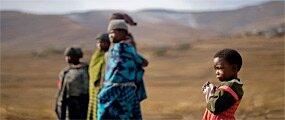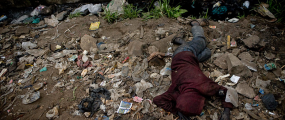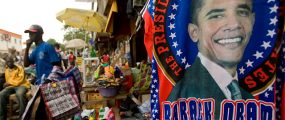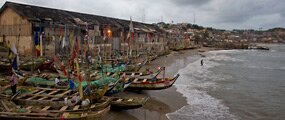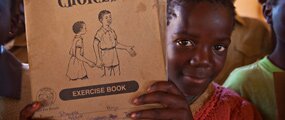Clay Pots Bring “Living Water”
Posted on Sept. 21, 2011
MITENDE, Democratic Republic of the Congo — Outside the high barbed walls and the pointed gates of Clean Water Congo, a generator roars with promise.
 On a sandy road in a small town on the outskirts of Congo’s capital, Kinshasa, is a newly-completed factory for clay water filters. In the factory, smiling workers with clay-caked hands work among rows of wet pots waiting to be dried and fired in a kiln. When the factory is complete and drinking water becomes available, the quality of life in this community is expected to improve dramatically.
On a sandy road in a small town on the outskirts of Congo’s capital, Kinshasa, is a newly-completed factory for clay water filters. In the factory, smiling workers with clay-caked hands work among rows of wet pots waiting to be dried and fired in a kiln. When the factory is complete and drinking water becomes available, the quality of life in this community is expected to improve dramatically.
IMB missionary Alan Dennis, 24, worked alongside Congolese helpers Elvis Bwelandi and Nganu Jean for almost two years to build this factory from the ground up.
UNICEF reports that less than half the population of Congo has access to a safe source of clean drinking water. In Mitende clean water is sold for almost 50 cents per half liter — far beyond the budget of the average Congolese.
“Here in Congo there are very many sicknesses,” Bwelandi said. “Amoebas in the water can even kill. If somebody has a filter like this their sicknesses will diminish significantly.”
The lists bacterial and protozoal diarrhea, hepatitis A and typhoid fever as the main waterborne diseases that Congolese are at high risk of contracting.
The filters are made from a mixture of clay and sawdust that is pressed into the shape of a flowerpot. When the pot is fired in the kiln, the sawdust burns out, leaving pores that allow water to filter through. Then the pot is painted with a silver nitrate solution that kills any bacteria that might make it through the clay. Finally the filters are placed in a plastic bucket, which collects and dispenses the clean water.
 A filter will be sold for the equivalent of 15 to 20 U.S. dollars and last for two years. It is an option significantly more affordable than buying bottled water. Dennis researched other ceramic filters on the market in Congo and found prices ranging from 300 to 600 dollars.
A filter will be sold for the equivalent of 15 to 20 U.S. dollars and last for two years. It is an option significantly more affordable than buying bottled water. Dennis researched other ceramic filters on the market in Congo and found prices ranging from 300 to 600 dollars.
When Dennis arrived in the small town of Mitende, he found a small plot of land with the beginnings of a wall around it and two pole barns to work under. Soon there was a one-room home for him to live in and a storage room for the equipment. It was up to Dennis and his two Congolese helpers to build the kiln and turn their small compound into a factory.
There were many setbacks in the creation of Clean Water Congo.
“It has been pretty hard sometimes to see God in the building process,” Dennis said. “I mean even just from the beginning I was — this was just my naiveté — … thinking that we would be done with the kiln within three weeks.”
Dennis, Bwelandi and Jean dealt with a broken generator, unavailability of machine parts, structural flaws in the kiln’s roof, and their largest setback — an accident that nearly took Dennis’s life.
“Including my two-month recovery time in Kenya, it took us well over eight months to finish the kiln,” Dennis said.
Despite these discouraging events the men have expressed repeatedly a desire to “press on” to complete the task they feel God has given them.
 “The reason that we’re working through all of that is because God loves us and He’s able to give us strength to press on,” Bwelandi said. “It’s not our own strength that’s working. It’s God’s hand that is moving us forward.”
“The reason that we’re working through all of that is because God loves us and He’s able to give us strength to press on,” Bwelandi said. “It’s not our own strength that’s working. It’s God’s hand that is moving us forward.”
The goal for these water filters is not only to give people physical health, but also to provide them with an opportunity for spiritual life.
“When we take these filters into peoples homes, we will educate them how the filter works,” Alan said. “What I want to do is incorporate the story from John — where Jesus says He’s living water — into the education about the filters.”
After an initial visit to deliver the filter, a second visit will be given two weeks later to ensure the proper usage and understanding of the filter. On this visit they will have the opportunity to share Christ again or provide discipleship and encouragement.
“[Christians] have to be helping people physically,” Dennis shared. “… We have been given grace and we desire to give that grace to someone else. We desire to share, even though we can never give the kind of grace that God has given us. We want to have that kind of love for them, in the way that God has loved us.”
Dennis’s two-year term in Congo is now over and he is back in the United States. At the end of his term, he left behind a busy factory with a sturdy brick kiln, a massive pile of firewood for fuel, and machinery succinctly mixing clay and pressing out wet pots to be dried and fired. Miraculously, he received the final part for his kiln just weeks before his return home.
 With the factory complete, Jean and Bwelandi are eager to begin distributing filters and sharing the Good News.
With the factory complete, Jean and Bwelandi are eager to begin distributing filters and sharing the Good News.
Dennis asks that believers join him in prayer for the workers at the factory:
- Pray for Jean and Bwelandi to receive the leadership they’re looking for to help guide them in their ministry.
- Pray they would be strong in the Lord and strong in their witness.
- Pray they would have a desire first and foremost to see people come to Christ, but also to serve them through the water filters.
- Pray they would be completely focused on the love of Christ through this factory.
- Pray for them to be dedicated to their work as if to the Lord and not to man.
You can help facilitate water projects like this one through .
Read about a similar water filter project in Kenya.
——-
Based in Africa, Zoe Allen is a writer with IMB’s global communication team.

